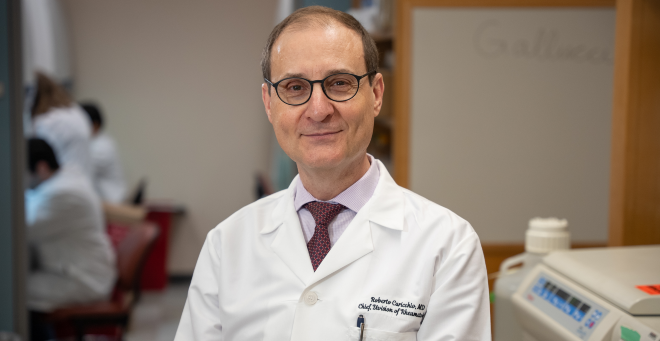Once a month, Talaya Reid wakes up early to board a flight from Philadelphia to Boston, in hopes of impacting research into lupus and the potential benefits of chimeric antigen receptor (CAR) T cell therapy to treat the chronic autoimmune disease.
Reid travels to UMass Chan Medical School in Worcester to participate in an individualized clinical research study exploring the use of CAR T cell treatment in lupus nephritis for severe or nonresponsive lupus. The Lupus Center at UMass Chan is one of five national sites participating in the trial sponsored by Kyverna Therapeutics. Reid is one of a dozen patients in the United States to have undergone CAR T cell treatment for lupus.
“I’ve participated in treatments before that have calmed my lupus symptoms down, but the symptoms were still there, or the treatments did nothing at all. When I heard it was possible to live without lupus symptoms or flare ups anymore, I was very interested in participating in this trial,” Reid said.
Roberto Caricchio, MD, the Myles J. McDonough Chair in Rheumatology, professor of medicine, chief of the Division of Rheumatology in the Department of Medicine and director of the Lupus Center at UMass Chan, is principal investigator of the CAR T cell therapy trial in lupus at UMass Chan.
“This treatment is not for everyone. It is for those patients who unfortunately have gone through several treatments that we have available and somehow the lupus does not seem to be matched by them. It’s a significant, but restricted group of patients. And within that group of patients, it takes a special individual who is looking for something different and commits to something new,” Dr. Caricchio said.
Lupus is a chronic autoimmune disease that involves multiple organ systems and often requires lifelong treatment with immunosuppressive or immunomodulatory drugs, which are not effective for all patients. Lupus nephritis is a complication of lupus that causes inflammation of the kidneys, impacting the body’s ability to remove waste from the blood or regulate body fluids.
"I’ve participated in treatments before that have calmed my lupus symptoms down, but the symptoms were still there, or the treatments did nothing at all. When I heard it was possible to live without lupus symptoms or flare ups anymore, I was very interested in participating in this trial."
CAR T cell therapy has been recognized as a significant advancement in treating cancers such as leukemia, lymphoma and more recently, multiple myeloma. CAR T cells are created by removing some of a patient’s white blood cells, including immune system T cells, and genetically altering them in a lab to produce CARs. These changes help the patient's T cells identify and kill antigens on the outside of the harmful cells once they are put back into the body.
Reid’s first treatment in March required a two-week hospital stay, during which she underwent lymphodepletion chemotherapy and an infusion of her CAR T cells and was monitored by medical personnel in the Blood and Marrow Transplant program at UMass Memorial Medical Center. She stayed in the Worcester area for three weeks after her discharge from the hospital before transitioning to monthly visits.
Each monthly visit to the Lupus Center at UMass Chan requires an assessment by a trained provider and extensive bloodwork at UMass Memorial Medical Center-Memorial Campus. During her day-long visit, Reid has more than 15 vials of blood taken. The blood samples are separated into two categories: for future Lupus research and for understanding what the CAR T cell therapy treatment is doing for her.
Once her bloodwork is completed, Reid travels back to Boston to catch a plane home to Philadelphia.
If her lupus symptoms haven’t flared up again, she will only need to come to Worcester for one visit in 2025. She will continue to be observed by the Lupus Center at UMass Chan for at least two years.
“As of now, I can say that this is the best I've ever felt. I feel really good,” said Reid, 28, a pharmaceutical scientist from Fairless Hills, Pennsylvania, who was diagnosed with lupus at 22. She said her flares previously ranged from minimal—fatigue or discomfort—to major, with joint pain and/or migraines that impacted her ability to attend college classes or work.
According to Caricchio, the Lupus Center has enrolled a second patient in the CAR T cell therapy trial who is expected to begin treatment in July.
“This treatment not only helps the patients currently participating in these trials, but also future patients,” Caricchio said. “It has been a very strong learning experience. The plus is that this type of treatment isn’t only groundbreaking but will also teach us a lot about lupus itself as a disease and we will be able to capitalize on that and find better ways to help patients.”
Caricchio cautioned that all results are preliminary, saying, “It is important to remember that this is an experimental treatment and therefore only upon completion of the clinical trial will we know if this approach is truly transformative for lupus patients.”
The Lupus Center is led by Caricchio and Elena Gkrouzman, MD, assistant professor of medicine, and includes a team of dedicated experts, including rheumatologists, dermatologists and nephrologists, as well as clinical research coordinators.
The CAR T cell therapy clinical trial at the Lupus Center at UMass Chan is conducted in collaboration with the Cancer Research Office at the UMass Cancer Center; the Blood Cancer Center physicians and teams, including Jan Cerny, MD, PhD, associate professor of medicine; Muthalagu Ramanathan, MD, professor of medicine; and Poorva Bindal, MD, assistant professor of medicine; and the Divisions of Hematology/Oncology and Renal Medicine/Nephrology.

